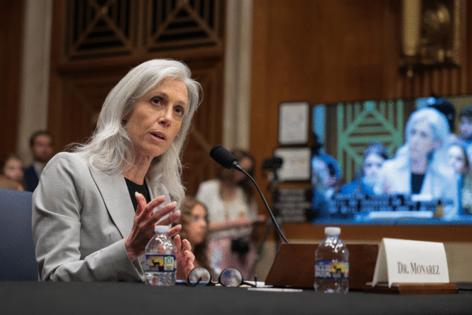Fired CDC employees dispute RFK's testimony to Senate
Published in News & Features
WASHINGTON — During a Senate hearing Wednesday morning, two former leaders of the Centers for Disease Control and Prevention contested Health and Human Services Secretary Robert F. Kennedy’s version of why they departed the agency in August.
“Since my removal, several explanations have been offered: that I told the secretary I would resign; that I was not aligned with the administration’s priorities; or that I was untrustworthy,” former CDC Director Dr. Susan Monarez told the committee.
“None of those reflect what actually happened,” she said.
The Senate held the hearing after the agency spiraled into chaos after Monarez was fired from her position as CDC director on Aug. 27, leading other senior leaders to resign.
Dr. Debra Houry, the agency’s former Chief Medical Officer and deputy director, was one of those leaders.
“Secretary Kennedy censored CDC science, politized its processes, and stripped leaders of independence,” Houry said. “I could not in good conscience remain under those conditions.”
“I resigned because CDC leaders were relegated to rubber stamps,” she added, pointing to several actions that fell short of the “gold standard of science” and “radical transparency.”
‘The American people need all the facts’
“What happened?” Sen. Bill Cassidy, R-LA, chair of the committee, said during his opening remarks. “The American people need all the facts.”
Monarez was fired 29 days after being confirmed to her position. She was the first Senate-confirmed CDC director.
“She took the radical position that she wanted to examine the scientific facts before drawing conclusions,” Sen. Bernie Sanders, D-VT, the committee’s ranking member, said. “She stood up for protecting the well-being of the American people. And for that reason, she was fired.”
The former director explained the events leading up to her firing.
It started on August 2 with the removal of experts serving on a vaccine advisory panel. The next week, Monarez learned that the panel might alter the childhood vaccine schedule at its September meeting without supporting evidence.
Then, a gunman, skeptical of vaccines, attacked the CDC office in Atlanta, killing DeKalb County Police Officer David Rose.
In the days after the attack, Kennedy’s office notified Monarez that she needed prior approval from her political staff for CDC policy and personnel decisions. On August 21, Monarez defied a directive to return to Washington, DC, telling the committee that she refused to miss Rose’s funeral.
On August 25, after returning to Washington, Kennedy directed Monarez to preapprove the vaccine advisory panel’s recommendations, “regardless of the scientific evidence,” Monarez said. He also told her to dismiss career officials responsible for vaccine policy, though he didn’t tell her why they should be dismissed.
At that point, Kennedy told her “he had already spoken with the White House several times about having me removed,” Monarez said.
_____
©2025 The Baltimore Sun. Visit at baltimoresun.com. Distributed by Tribune Content Agency, LLC.







Comments